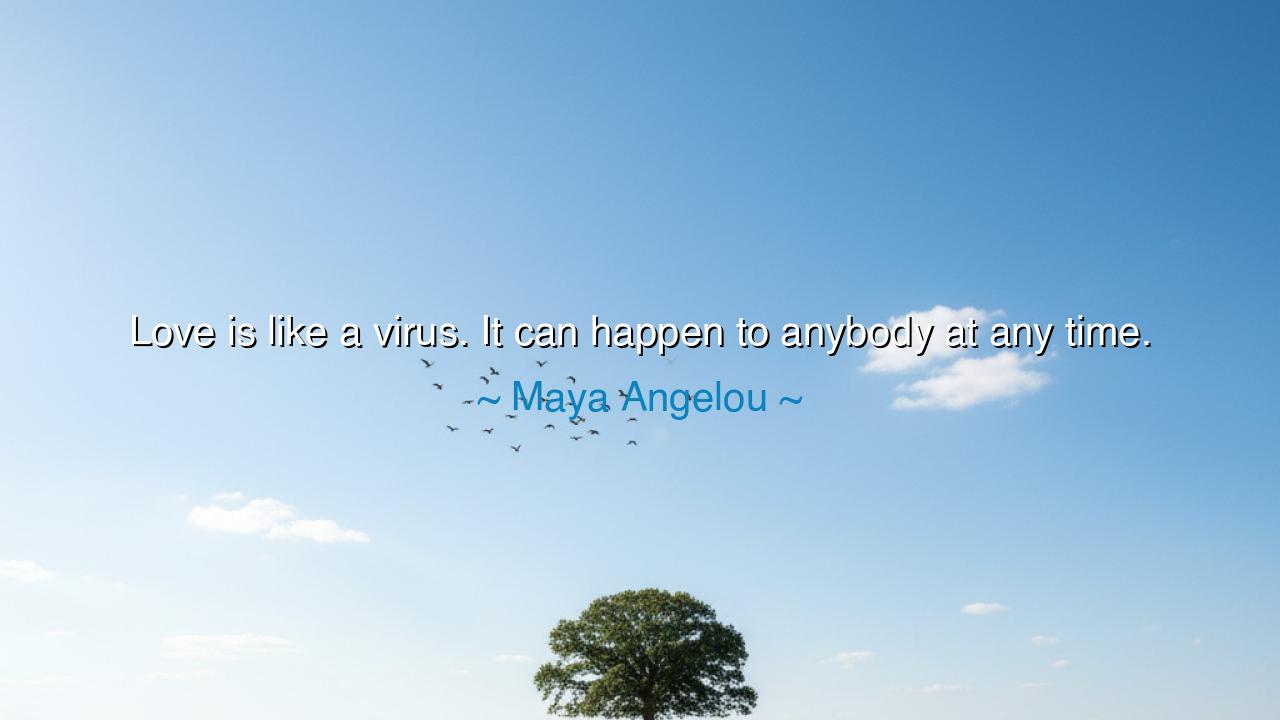
Love is like a virus. It can happen to anybody at any time.






“Love is like a virus. It can happen to anybody at any time.” Thus spoke Maya Angelou, the poet of the human soul, whose words flow like a river between pain and redemption. Her metaphor, at once startling and tender, unveils a truth as ancient as humanity itself—that love is not a tame or predictable force, but a living energy that moves through the world as mysteriously as life itself. By comparing love to a virus, Angelou captures both its power to spread without reason and its ability to transform those it touches. Love is not something we control or summon at will; it finds us, consumes us, and changes us, often when we least expect it.
Angelou’s life itself was the soil from which these words grew. She was a woman who had known both deep suffering and transcendent joy. Through her poetry and prose, she sought to remind the world that love—romantic, platonic, divine, and communal—is the one medicine that can heal the human condition. Yet she also knew that love is unpredictable, uncontrollable, and sometimes painful. Like a virus, it does not discriminate—it strikes the strong and the weak, the young and the old, the poor and the powerful. It spreads silently, through glances, through kindness, through compassion, and it takes root where reason cannot reach.
The comparison to a virus may seem dark to some, for we often think of illness as a curse. But in Angelou’s wisdom, the metaphor reveals the wild, involuntary nature of love. She teaches us that love is not always a choice; it overtakes us. It slips past our defenses and rearranges our priorities. Just as a virus changes the body from within, love changes the soul, altering how we see, how we act, how we understand the world. Those who have loved truly know this transformation—the way the heart expands beyond itself, the way fear dissolves before the presence of another. Love infects us with empathy, with courage, with the will to create and to forgive.
In ancient times, poets and philosophers spoke of love as a divine madness. Plato, in his Phaedrus, described love as a celestial infection sent by the gods to awaken the soul to beauty. To love, he said, is to be possessed—to see the divine in another and to be forever changed by that vision. Angelou’s words echo this same sacred madness. She does not mean that love is destructive, but that it is uncontrollable—a cosmic contagion that makes mortals feel the immortality of connection. It reminds us that we are not islands, but part of a vast, invisible network of hearts beating in rhythm across time.
Consider, too, the story of Florence Nightingale, the nurse who revolutionized medicine during the Crimean War. Her love for humanity was not born of logic, but of that same invisible contagion that Angelou describes. She was “infected” with compassion, unable to rest while others suffered. It spread through her into the world, healing countless lives and inspiring generations. This is love’s true power: it multiplies. One act of kindness, one word of mercy, one moment of courage—each can spread from soul to soul like the gentlest epidemic, crossing nations and centuries.
Angelou’s metaphor also carries a warning: because love is like a virus, it can make us vulnerable. To love is to risk fever, to risk heartbreak, to surrender control. But the wise know that such vulnerability is not weakness—it is the price of being truly alive. For those who guard their hearts against infection may remain safe, but they also remain untouched by wonder. The heart that does not risk love is like a body untouched by warmth—it survives, but it does not live.
Therefore, my children of the heart, take this lesson deeply: do not fear the virus of love. Let it enter you, even when it comes uninvited. Allow it to teach you empathy, to awaken in you the desire to serve, to forgive, to connect. If love finds you, do not resist it—let it run its course through your being, purging bitterness and pride. And when it fades, as all things mortal do, remember that its trace remains within you forever, strengthening your spirit for the next encounter.
In the end, Maya Angelou’s words are not merely about romance—they are about the condition of being human. Love, she tells us, is the unseen force that binds all existence together. It is spontaneous, contagious, divine, and unstoppable. It is both the sickness and the cure. And so, live in such a way that you remain open to its touch. For when love passes through you, you become not only a vessel of its power, but also a carrier of its light—infecting the world, quietly and eternally, with the healing of the heart.






AAdministratorAdministrator
Welcome, honored guests. Please leave a comment, we will respond soon